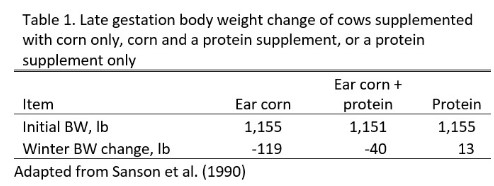By Travis Mulliniks, Range Production.et.al
As winter progresses, winter nutrition and increased environmental stress on cows may concern many cow-calf producers. Winter nutritional management affects not only the profitability of a beef cowherd, but also the future performance of the cow and her offspring. With that in mind, building a nutritional program for a cow-calf system requires understanding nutritional requirements, knowing the “stress periods” that can happen, and knowing the quality and quantity of your forage resources.
One “stress period” is late gestation. Moving from mid to late gestation increases a cow’s energy requirement 25% and her protein requirement 10%. In addition, the nutritional management of the pregnant beef cow can affect her calf’s performance. Developmental, or fetal, programming is the idea that the maternal environment affects fetal development and the offspring long-term. Calves born from nutrient-restricted dams during late gestation have been shown to have reduced immunity. It can be tempting to let dry, pregnant cows “rough it” on low-quality range or forages with little to no supplement in an attempt to save money. However, providing good nutrition to pregnant cattle during late gestation supports rapid fetal growth, calf health and performance. In addition, it prepares the cow for her greatest nutritional “stress period” of lactation, which can affect her subsequent reproductive performance.
The impact of winter weather should not be ignored. When the effective temperature is below the animal’s lower critical temperature, the animal must increase heat production to maintain a constant body temperature. To produce more heat, the cow must either receive more energy from the feed ration or draw on her body stores. Seven days or more of cold, windy or wet weather will increase cow energy requirements 10 to 30%. If hay or forage quality is good, intake will increase; however, the increased intake and overall energy intake may not be enough to meet requirements. With low-quality forage, cows will need additional supplement during extreme weather. If cows are not fed enough during cold stress periods, they can easily drop a body condition score (BCS) in 30 days or less. To review BCS, a management tool to measure a cow’s energy reserves, please visit:
https://beef.unl.edu/learning/condition1a.shtml and
https://beef.unl.edu/a-practical-guide-to-body-condition-scoring.
On a scale of 1 to 9, a calving BCS of 5 to 6 is considered optimal at calving. Weather changes and forage availability can make achieving an optimum BCS 60 to 90 days before calving difficult. A mild winter may result in most cows being BCS 5 or greater, whereas a harsh winter may result in cows calving at BCS < 5. Measuring BCS in the winter can be deceiving due to gut fill of low-quality forage, winter hair coat, or environmental conditions. Thin cows with increased gut fill of low-quality forages can be mistaken as being in better condition than they truly are. Long winter hair coats can mask prominent ribs or the vertebrae, landmarks used in scoring body condition. After a winter storm, cows can also look thinner than they actually are with a shrunk appearance due to a lack of water and forage intake.
The last chance to economically increase BCS on a cow during late gestation is the last 90 days prior to calving. After that, it is difficult for a thin cow to gain condition immediately after calving because it requires large amounts of high quality feeds, due to her increased nutrient demand for lactation.
This leads us to supplementation options. When cows are thin or grazing low-quality forages, some producers want to increase energy intake with corn, but this can backfire in some circumstances. Feeding corn on a forage-based diet can reduce forage intake and digestibility because the increased levels of starch from the corn alter rumen microflora and ruminal fermentation. The level of protein in the diet determines how corn supplementation affects cow performance. If the cow’s protein requirement is not met, feeding corn alone may actually increase body weight loss during gestation (Table 1) compared with feeding corn + protein or protein alone. Protein supplements improve cow nutritional status by increasing digestibility and intake of low-quality forages and/or increasing nutrient flow of protein from the rumen to the intestines. If cows are thin, both protein and energy supplementation is needed to increase BCS. With cows in good, acceptable BCS, protein supplementation on low-quality forages can maintain BCS or slightly increase BCS over winter. Thin cows (BCS ≤ 4) or young cows could be sorted and fed separately from the mature cowherd. This would allow for more strategic supplementation and decrease overall feed costs. Typically, a cow must gain 75 to 100 lbs of body weight to increase 1 full BCS, but during late gestation that number increases to account for fetal growth and placental weight. Thus, it is important to distinguish body weight differences due to differences in BCS and body weight changes resulting (and required) by fetal growth.

At the end of the day, BCS is an insurance policy or risk management. It is easier to stay ahead while maintaining adequate BCS than letting cows slip and get behind. Getting behind during late gestation can decrease rebreeding performance of the cowherd and negatively influence calf performance.
Things to consider for winter management:
Obtain a nutrient analysis of forage resources
Inventory forage resources by quality
Sort cowherd into nutritional needs groups (thin cows and young cows)
Match forage resources with those nutritional needs groups
Determine supplemental needs and balance diets to minimize costs
Use body condition score (BCS) as a guide and monitor throughout the winter
Adjust supplemental energy for cold stress and/or for thin cows
Source : unl.edu